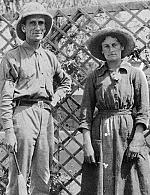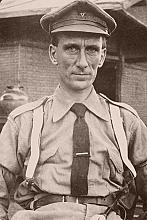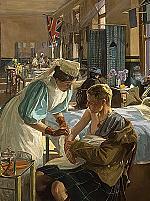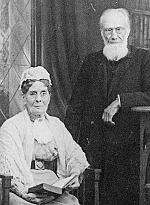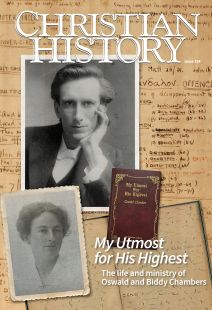“Beloved Disciple”
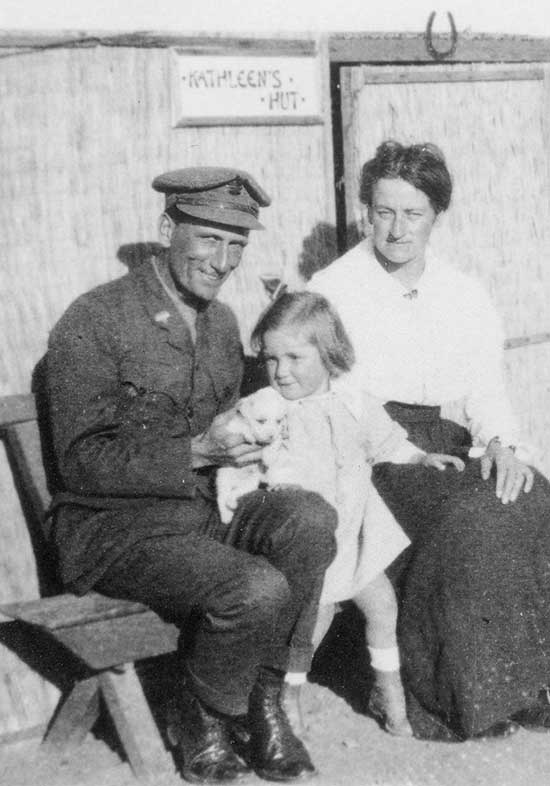
[Above: Oswald Chambers, Kathleen, and Biddy in front of Kathleen’s Hut, 1914 to 1918—Oswald Chambers Publications Association, Ltd. / Wheaton College Archives & Special Collections]
With only $16 in her purse, 24-year-old Gertrude Annie Hobbs (1883–1966) boarded the SS Baltic, setting sail from Liverpool, England, for New York City. The ambitious and gifted stenographer sought both adventure and a job opportunity in the United States.
Hobbs was ready, but her mother felt less enthusiastic about her solo transatlantic journey. Thankfully, someone the family knew would also be aboard the SS Baltic: itinerant preacher Oswald Chambers, brother of their pastor, Arthur Chambers.
This “coincidence” would change the young woman’s life forever.
FROM TRUDA TO “BD”
Born in Woolwich, England, Gertrude “Truda” Hobbs grew up the youngest child in a middle-class household south of the Thames River. She relished a happy childhood of tennis, piano playing, books, and tea parties.
All that ended at the age of 15 when chronic bronchitis, exacerbated by London’s black fog, ended her education. Six months later, her father’s death plunged the family into financial hardship. While her older siblings went to work, Truda languished until she took a shorthand correspondence course. Determined to contribute to the family’s livelihood, she practiced diligently and eventually could “take down” dictation at the astounding rate of 250 words per minute.
Hired by the nearby Woolwich Arsenal, Hobbs set her sights on someday becoming secretary to the prime minister of England. In 1908 she spread her wings and headed for New York City. Before she sailed her mother wrote to Oswald Chambers, traveling on the same ship, asking him to look in on her. Though he liked to read while voyaging, the amiable bachelor agreed to help. Chambers already knew Hobbs, having visited her family’s home for tea after filling the pulpit for Arthur. But during this trip, Chambers saw her with new eyes. Lovely, intelligent, and well-read, the young woman nine years his junior impressed him with her ambition and ability as a stenographer.
Unfortunately she shared a name with his favorite sister. As Chambers loved nicknames, he rechristened Truda “Beloved Disciple.” “Beloved Disciple” soon became too unwieldy, so he shortened it to “BD,” and thence to “Biddy,” which is what everyone called her for the rest of her life. They were in love by the time they reached New York.
The two parted ways when the voyage ended, but they struck up a relationship over letters. Oswald knew that Biddy and he were a perfect match in life and work, but he had no money. His proposal in 1908 was to the point: “I have nothing to offer you but my love and steady lavish service for Him.” He explained their home would be meager with their lives “going heart and soul into literary and itinerating work for Him. It will be hard and glorious, and arduous.”
She said yes.
After their marriage in 1910, the two opened the Bible Training College (BTC) in Clapham Common, London. Oswald served as principal, Biddy as superintendent. While he taught, Biddy sat in the back row and took down everything he said. She also managed the correspondence and organization, answered the mail and telephone, and ran the school—whenever she didn’t stop to pray or drink tea with whomever needed her attention.
Eventually she turned her shorthand notes into two books published by the Revivalist Press: Biblical Psychology (1912) and Studies in The Sermon on the Mount (1915). In 1913 Biddy gave birth to their only child, Kathleen. With their daughter, the school, and the students, the Chambers family was content.
And then World War I began.
FRONT-LINE MINISTRY
Oswald felt stirred to help and after much prayer, volunteered to be a chaplain with the Young Men’s Christian Association (YMCA) in Egypt. He arrived in October 1915. He did not decide alone. As he wrote his parents, “Biddy is just keen on the thing, and will never do anything but back me up, no matter what it costs her.”
Oswald asked to bring his wife and toddler with him to the Zeitoun desert camp. The surprised YMCA agreed. Biddy, Kathleen, and friend Mary Riley arrived three months later. Biddy’s welcoming touches soon appeared: tea for visitors, walks under the desert stars, and a seat at Oswald’s YMCA talks with notebook in hand. She left behind a trunk full of BTC notes in London and added to her collection in Egypt.
The couple realized the soldiers’ lives teetered on eternity. Oswald preached the gospel daily; the rest of the Zeitoun YMCA personnel demonstrated it. When several former BTC students joined them to help, Biddy and Oswald arranged for the camp to become a respite for struggling soldiers. They even provided free Sunday afternoon teas (see p. 17).
Biddy prayed and cared for both Oswald and the camp while he traveled among other YMCA camps as far as the Suez Canal. At every opportunity, Biddy wrote down his words. By summer 1917 Oswald wrote a friend, “I hope to send you a book on Job soon (at least Biddy does, I take no more responsibility after having spoken my mind).”
He reviewed the book proofs before preparing to “embed” with Zeitoun Light Horse units leaving to take Jerusalem. He’d arranged for Biddy to run the camp during his absence. But Oswald Chambers never joined his unit. He fell ill and died of complications from appendicitis on November 15, 1917, at Gizeh Red Cross Hospital.
It was, as Kathleen Chambers later recalled, the first time she had ever seen her mother cry. The shocked and grieving Biddy sent a simple cable message home to family and close friends: “Oswald in His Presence.”
THE MINISTRY OF THE BOOKS
Despite the tragic and overwhelming loss, Biddy persevered in the work she and her husband had started. The YMCA asked Biddy to run Zeitoun for the duration of the war. She led morning services and taught two classes a week using her notes from Oswald’s teachings. In addition she compiled these teachings into pamphlet form, sending them out each month by popular request.
In 1918 the YMCA took over the monthly printing and distribution and sent 10,000 copies a month to camps throughout the world. Still readers asked for more. So Biddy compiled Oswald’s pithy daily Zeitoun quips into The Seed Thoughts Calendar. As Kathleen later observed, “She never was hurried, she was relaxed, and often said, ‘Let’s see what God does next.’”
Biddy and Kathleen repatriated to England in 1919. Without a pension, savings, or insurance, all Biddy had to support them were two trunks full of shorthand notes. Biddy believed Oswald was a man “to whose teaching men will return.” She devoted the rest of her life to turning his words into what became over 40 books.
She saw the book publications as a ministry—and took no payment for herself. All royalties earned went into preparing the next book compiled from her notes. She and Kathleen lived on the generosity of friends during those early years. Biddy compiled My Utmost for His Highest while running a boarding house in Oxford (see pp. 24–26).
After the 1927 publication of My Utmost for His Highest, a group of friends formed the Oswald Chambers Publications Association, Ltd. (OCPAL) to help her manage the Chambers books. They advised and encouraged her. As chairman, Biddy insisted she be able to give away all the books she wanted. She took no salary beyond basic expenses.
During World War II’s “phony war” (the brief, quiet period before Allied forces faced open hostilities), OCPAL voted, “in accordance with the teaching of the books,” not to insure the Chambers canon, nor file a claim if they later regretted not doing so.
On December 29, 1940, the German Blitz dropped 100,000 incendiary bombs on the booksellers’ storehouses surrounding St. Paul’s Cathedral. Called the “crematories of the city’s book world,” one million books burned—including all the unsold Chambers stock.
Biddy maintained a simple attitude throughout the calamity. If God wanted the work to continue, it would. If this was his way of ending production of the Oswald Chambers books, she believed God would direct her to do something else.
“All my life my mother . . . never for half a second questioned what God allowed to happen, ever,” Kathleen said of Biddy’s unflappable faith.
In nooks and crannies, printing houses, and obscure bookstores, eventually enough books and book printing plates turned up. By the war’s end, Oswald Chambers’s books were available for sale once more.
GIVING HER UTMOST
Biddy survived her husband by 49 years. Eventually living in London’s Muswell Hill, hers was a life of hospitality, prayer, shorthand notes, typing, and books. If someone rang the doorbell looking for Oswald Chambers—listed as the author on the book covers—she invited them in for tea.
Faith sustained, kept, and encouraged Biddy Chambers her entire life. She died after a lengthy illness on January 15, 1966. As Rev. Stephen Pulford wrote about Biddy and Oswald: “of no two saints may it more truthfully be said, ‘their works do follow them.’” CH
By Michelle Ule
[Christian History originally published this article in Christian History Issue #154 in 2025]
Michelle Ule is the author of Mrs. Oswald Chambers and A Poppy in Remembrance, a WWI novel featuring Oswald Chambers.Next articles
Serving God here and “Beyond”
Oswald and Biddy’s transformational ministry in Egypt
Annalise DeVriesBaffled to Fight Better
During the spring of 1917, Chambers spoke nightly on the book of Job
Oswald ChambersChristian History Timeline: Oswald Chambers
In His presence: the life and work of Oswald Chambers
the editors



